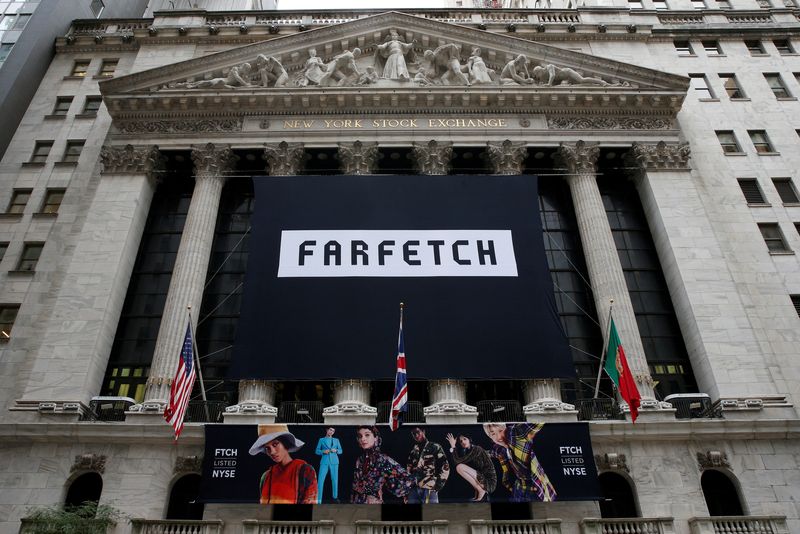
© Reuters. FILE PHOTO: A banner to rejoice the IPO of on-line vogue home Farfetch is displayed on the facade of the of the New York Inventory Change (NYSE) in New York, U.S., September 21, 2018. REUTERS/Brendan McDermid/File Picture
2/2
By Mimosa Spencer and Abigail Summerville
PARIS (Reuters) – A winding down of the post-pandemic spending frenzy is hitting European luxurious firms from LVMH to Kering (EPA:), however none greater than Farfetch (NYSE:), an e-commerce pioneer.
Based in 2007, Farfetch is without doubt one of the few world on-line retailers of high-end merchandise from a spread of labels, comparable to a $5,690 Saint Laurent wool coat and a $5,900 white gold De Beers diamond necklace.
Recently, Farfetch has been touting reductions of as much as 45% off clothes and accessories from plenty of smaller manufacturers – Diesel, Balmain, Lanvin and Balenciaga amongst them.
Its shares plunged over 50% on Nov. 28 after the corporate postponed its quarterly earnings report, saying that prior monetary steering “ought to not be relied upon”.
On Tuesday, Moody’s (NYSE:) downgraded the corporate’s credit standing deeper into “junk” territory and put it on evaluation for an extra minimize, citing its deteriorating monetary place.
Farfetch’s woes mirror greater than the financial headwinds dampening aspirational customers’ demand for brand new fashions.
Its longer-term problem is a drive amongst labels to hunt higher management of their merchandise, often at their very own retail boutiques – a technique geared toward avoiding reductions that third get together retailers like Farfetch depend on to draw customers.
Powerhouse manufacturers Chanel, Hermes, and LVMH’s Louis Vuitton and Dior have led the cost to manage all points of promoting their merchandise, whereas Burberry is decreasing the variety of third get together retailers carrying its merchandise and upgrading its boutiques. It opened 33 shops together with in Los Angeles, Tokyo and London within the first half of the 12 months.
Kering, which owns Gucci, Saint Laurent and Balenciaga, additionally not too long ago opened shops in these cities.
“It’s a development that manufacturers want to manage their very own distribution,” mentioned Caroline Reyl of Pictet, a Swiss multinational personal financial institution and monetary companies agency that holds shares in Richemont and LVMH, however not Farfetch.
By tightening their grip, additionally by means of shop-in-shop agreements in shops, “they management all the pieces, mainly,” together with pricing, customers’ information and model positioning, Reyl mentioned of the high-end manufacturers.
Farfetch declined to remark when requested by way of e-mail concerning the change in distribution traits.
The London-based firm, which is listed in the USA, is working with JPMorgan and Evercore to discover choices together with a sale, two sources near the matter have mentioned.
Farfetch’s founder Jose Neves is contemplating taking the corporate personal, in response to the Each day Telegraph newspaper.
Farfetch and JP Morgan declined to remark. Evercore didn’t instantly reply to requests for remark.
DIVERSIFICATION AND COMPLICATION
Richemont, going through related challenges to its on-line enterprise YNAP, which incorporates Web-a-Porter, entered an settlement in 2022 for Farfetch to finally take management of YNAP – a deal involving the switch of Richemont labels to Farfetch expertise.
Farfetch isn’t just an internet market. It is also a tech firm powering e-commerce for high-end UK division retailer Harrods, Italian vogue home Ferragamo, and is within the midst of doing the identical for U.S. division retailer Bergdorf Goodman.
Richemont on Nov. 10 expressed confidence in Farfetch expertise, however mentioned it will not inject money into the corporate.
Farfetch and Web-a-Porter additionally search to attract prospects with unique affords from manufacturers, with Farfetch not too long ago providing early entry to pre-spring appears like a 1,950 euro ($2,105) floral print costume from Dolce & Gabbana and Web-a-Porter promoting a restricted version 1,700-euro wool skirt from Gucci, embellished with a horse bit, forward of its official launch this month.
However reductions, which labels concern cheapen their picture, stay a key draw for customers of on-line marketplaces.
“Main manufacturers shall be reluctant to interact, as they try to implement excessive worth self-discipline and avoid promotions, whereas weaker manufacturers will play ball,” predicted Bernstein in a 2019 notice to shoppers.
Farfetch launched into a diversification technique that 12 months, shopping for manufacturers and licences to distribute them, like streetwear label Off White, by means of the acquisition of New Guards Group.
In 2022, it added a licence deal to distribute Reebok merchandise and expanded into magnificence with the acquisition of Violet Gray, gaining management of merchandise to probably pull customers to its web site – although it has since retrenched from magnificence and mentioned in August it was contemplating choices for Violet Gray.
However slowing demand for luxurious merchandise in China and the USA sophisticated its efforts to show a revenue, whereas critics say the enterprise has grow to be too sophisticated.
Olivier Abtan, a marketing consultant at Alix Companions, mentioned that when a retailer is below heavy gross sales stress, coupled with profitability points, it may very well be tempted to extend low cost ranges – however that may grow to be a vicious circle.
“In my expertise, when an organization isn’t doing nicely, peak seasons don’t assist them enhance, however reasonably are inclined to exacerbate the decline,” Abtan mentioned.
($1 = 0.9264 euros)

